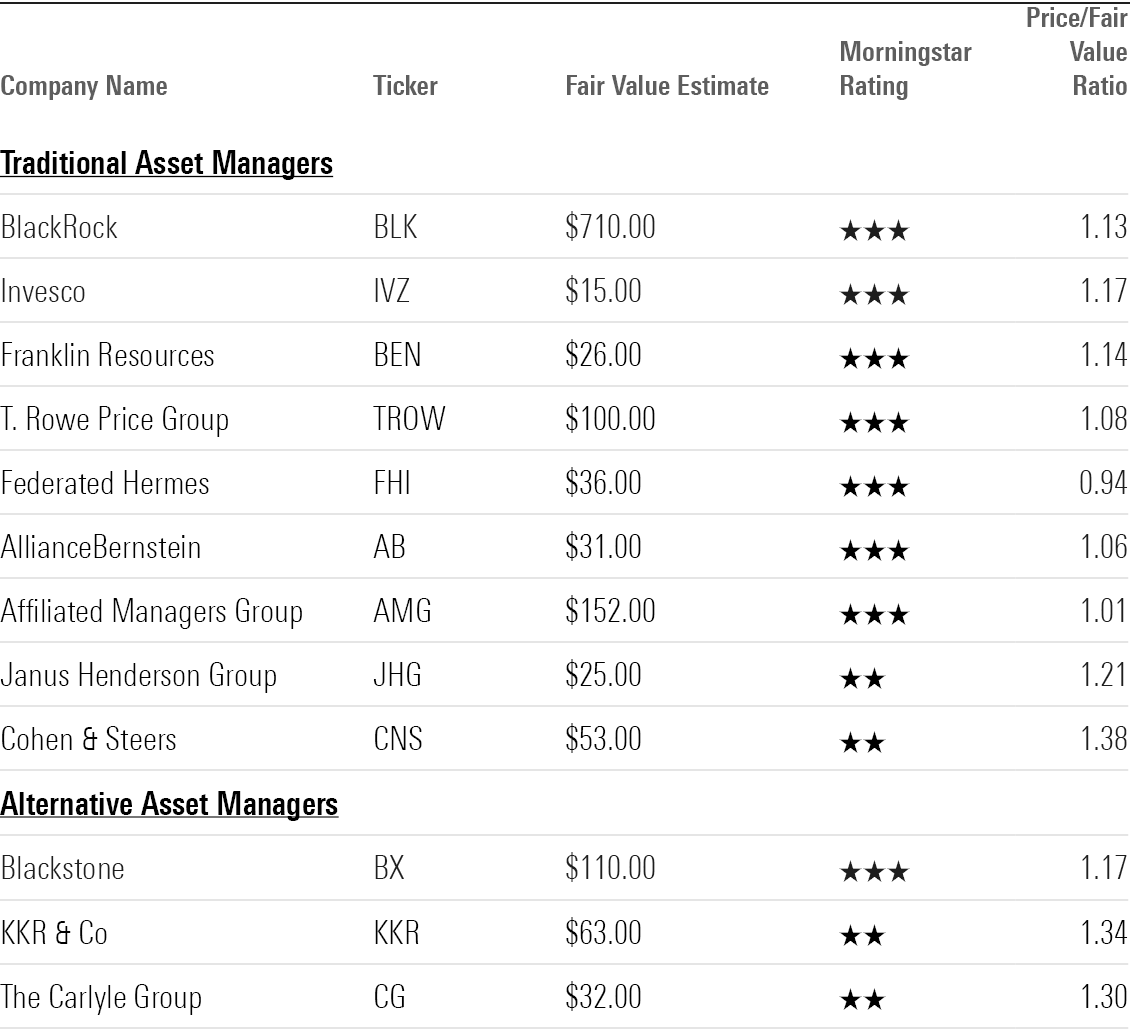2 Top Asset Manager Stock Picks
Despite headwinds from downward pressure on fees and the bear market, bargain stocks are hard to find.

It’s been a challenging period for many traditional asset management companies. They’ve faced headwinds from downward pressures on fees and the lingering impact of the 2022 bear market for stocks and bonds, which had sent assets under management tumbling.
For companies focused on alternative investment strategies, it’s been a different story, thanks to the growing demand for their funds.
The challenge now facing investors in asset manager stocks is that as the stock and bond markets have recovered, valuations have also risen, with most of the names covered by Morningstar trading close to or above their fair value estimates.
The 2023 gains in the markets “does mean managers are starting 2024 with slightly higher assets under management than we were anticipating, but they are still fairly valued, with few (if any) bargains to be found,” explains Morningstar strategist Greggory Warren.
Asset Manager Historical Price/Fair Value Ratios
Warren highlights two top picks among the 12 traditional and alternative asset managers he follows:
The full list of 12 is at the end of this article. Here’s a closer look at the key trends across the industry that are driving asset manager stocks, along with Warren’s thoughts on the outlook.
Low-Cost Funds Continue to Take Market Share
“On the traditional side of the business, low-cost, passively managed products have taken share from actively managed funds over much of the past two decades. An ongoing shift to fee-based accounts over commission-based structures in the retail-advised channel, along with institutional investors turning more and more to index-based funds (including ETFs) to gain market exposure while pursuing alpha with other products (like private equity and private debt), has increased the demand for index funds and ETFs in the marketplace.”
Passive Continues to Take Share
Downward Pressure Continues On Fees
“Average asset-weighted fund fees have been falling for more than two decades, with the average fee rate for actively managed funds dropping below 60 basis points in 2023, while passive funds have slid 11 basis points. Management fees have been pressured by the growth of the passive market, as well as pressure from distributors looking for low-cost higher-performing funds for their platforms. Going forward, we expect an average annual fee decline of 2.5% for our traditional asset-management coverage during 2023-32.”
Fees Continue to Be Pressured
Warren notes that traditional asset managers’ greater exposure to actively managed stock funds is a negative for organic asset growth, which measures inflows or outflows as a percentage of starting assets.
Percentage of Industry AUM by Asset Class
“Passive product growth over the past 20 years has hurt active equities, and active bonds have also not been immune, although these are still the early days, with much of the passive bond growth not being replacement-based.” As passive funds grow, traditional active fund managers continue to struggle to generate positive flows, Warren explains.
Overall, Active Funds Will Continue to Be Heavily Influenced by Equity Flows
Growth of Passive Products Continues to Impact Active Equity Funds
Active Bond Funds Have Yet to Be Supplanted by Passive Fund Offerings
Alts Managers See Demand Tailwinds
“While traditional active managers struggle to find growth, alternative asset managers continue to benefit from a demand tailwind, which has seen AUM dedicated to the space rise from $3.2 trillion (including $1.5 trillion in dry powder) at the end of 2008 to $13.3 trillion (with $3.3 trillion in dry powder) at the end of 2022. With demand for alternative assets likely to diminish this decade (following an exceptional period of growth during 2010-20), growth will slow. But we still see the industry sitting on $21.9 trillion (with $4.0 trillion in dry powder) at the end of 2032.”
Alternatives Continue to Grow
Warren continues: “With demand for alternative assets already slowing, we expect total AUM levels to increase 65% (or 5% annually on average) from $13.3 trillion (with $3.3 trillion in dry powder) at the end of 2022 to $21.9 trillion ($4.0 trillion) at the end of 2032. Given the track record of returns for buyout, growth/expansion, and venture capital funds relative to other alternative asset segments, we expect the private equity category to continue to grab the lion’s share of fundraising and invested capital.”
Traditional Asset Managers Targeting Alts
“While alternative asset managers have enjoyed a long period of exceptional growth, we think things will be much harder for them in the future, and not just because allocation percentages are capped in the long run. We see traditional asset managers continuing to increase their exposure to alternative assets over the next decade, which could prove problematic for the five largest standalone alternative asset managers. We believe traditional asset managers are likely to be more fungible on fees than alternative asset managers have been historically—especially with base management fees for alternative assets being higher than what most traditional asset managers earn on their core offerings.
“With the future holding increased competition from peers, increased pressure on fees, higher overall tax rates relative to the past, and a general maturation of the alternatives industry (from a solid period of above-average growth over the past decade), it will become increasingly difficult for these managers to consistently generate excess returns.”
Several Traditional Asset Managers Have Been Building Scale in Alternatives but Still Trail Largest Players
Top Asset Manager Stock Picks
BlackRock
- Fair Value Estimate: $784.22
- Economic Moat: Wide
“While there are a handful of traditional asset managers trading at deeper discounts to our fair value estimate than BlackRock, we prefer the wide-moat rated firm over its peers. At its core, BlackRock is a passive investor, sourcing close to two-thirds of its $9.1 trillion in managed assets at the end of September 2023 (and nearly half its annual revenue) from passive products sourced through its iShares exchange-traded fund platform and institutional index fund offerings. The company also has one of the largest active asset-management businesses in the United States.
“After a dismal 2022, BlackRock has benefited from a recovery in the equity markets this year, even if it has been in fits and starts, and is likely to see its AUM recover to pre-2022 levels faster than its peers. Over the next five years, we believe an expanding ETF market, BlackRock’s improved active fund operations, an expansion of its multi-asset and alternatives platforms, the continued adoption of ESG analytics and investing, and the firm’s ongoing technology efforts will drive growth.
“We expect the market to continue to discern between firms with above-average organic AUM growth and operating profitability and those struggling to generate either, with the former garnering higher trading multiples (of 15-25 times forward earnings) and the latter seeing much lower multiples (of 5-15 times). BlackRock remains our top pick among the stand-alone publicly traded traditional U.S.-based asset managers that we cover.”
Blackstone
- Fair Value Estimate: $112.33
- Economic Moat: Narrow
“Higher interest rates and lower equity valuations have impacted fundraising, deployment, and harvesting activity for alternative asset managers like Blackstone. While redemptions are likely to remain elevated for funds with shorter lockup periods, fundraising should recover over time, with deployments and harvesting picking up as the equity and credit markets recover and stabilize. Blackstone remains our top pick among the alternative asset managers we cover, despite all these firms benefiting from the tailwind provided by heightened demand for alternative products over the past decade.
“While Blackstone is facing some redemption pressure in its two main retail funds, BREIT and BCRED, the company is in its latest fundraising ‘super cycle’ and remains better-positioned to navigate the current climate than its peers. We consider Blackstone the preeminent alternative asset manager, with $1.1 trillion in total managed assets, including $734.5 billion in fee-earning AUM, at the end of September 2023.
“Blackstone’s product platform is broadly diversified across four business segments—private equity (23% of fee-earning AUM and 28% of base management fees), real estate (39% and 43%), credit and insurance (29% and 21%), and hedge fund solutions (9% and 8%)—with meaningful scale in each category. With customer demand for alternatives expected to stay elevated and investors in alternative assets looking to limit the number of providers they use, large-scale players like Blackstone are well-positioned to gather and retain assets for its funds.”
Year to Date Performance
Here’s a look at the asset manager stocks covered by Morningstar.
Money Manager Stocks

The author or authors do not own shares in any securities mentioned in this article. Find out about Morningstar’s editorial policies.

/s3.amazonaws.com/arc-authors/morningstar/11520ec8-017f-48a5-99dd-e50a7df9126e.jpg)
/cloudfront-us-east-1.images.arcpublishing.com/morningstar/ECVXZPYGAJEWHOXQMUK6RKDJOM.jpg)
/cloudfront-us-east-1.images.arcpublishing.com/morningstar/KOTZFI3SBBGOVJJVPI7NWAPW4E.jpg)
/cloudfront-us-east-1.images.arcpublishing.com/morningstar/V33GR4AWKNF5XACS3HZ356QWCM.jpg)
:quality(80)/s3.amazonaws.com/arc-authors/morningstar/11520ec8-017f-48a5-99dd-e50a7df9126e.jpg)